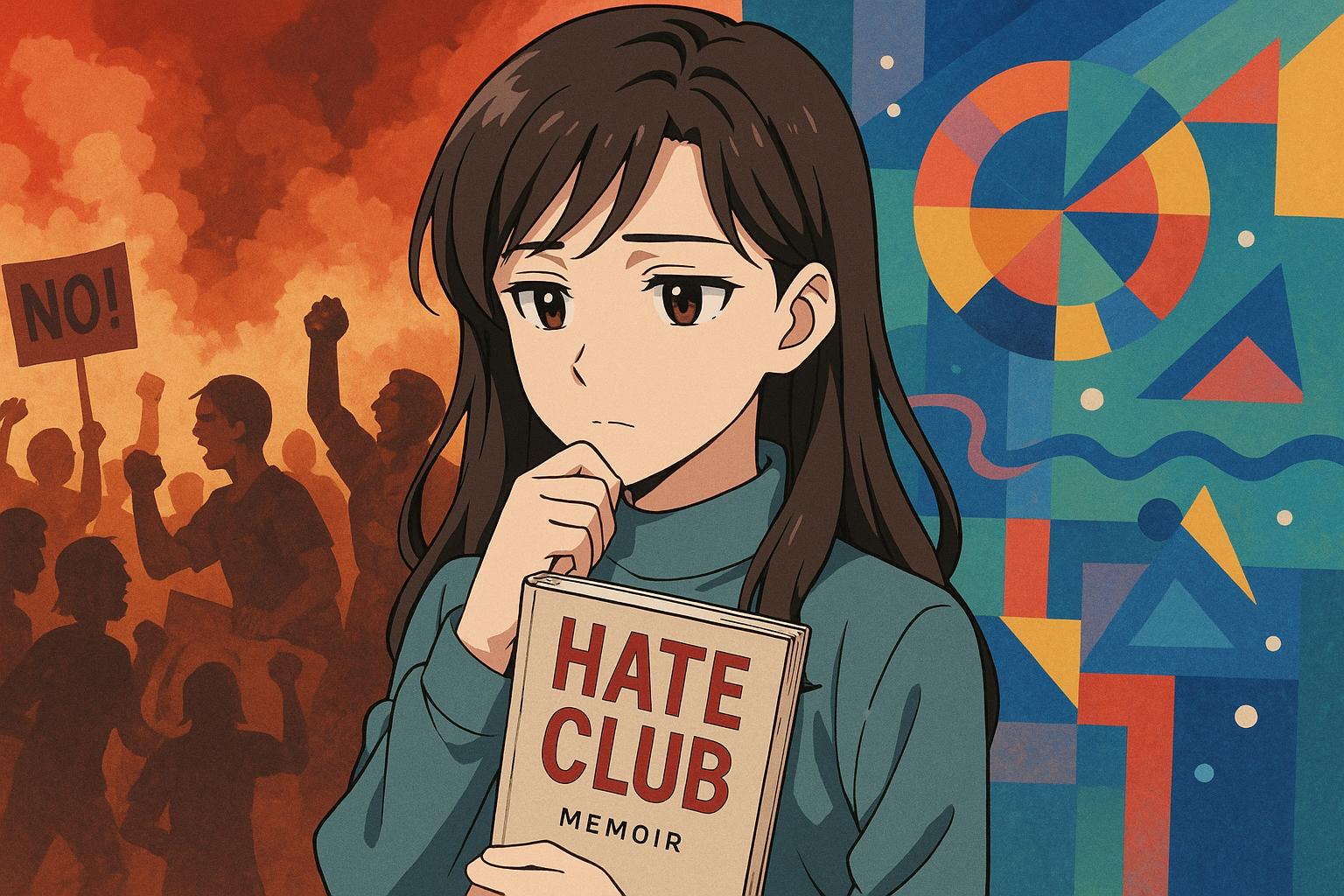Former free speech activist Lucy Brown reveals the turbulent realities behind the movement in her upcoming memoir Hate Club, candidly critiquing its leaders and reflecting on her changed views amid personal milestones. Meanwhile, partner Sascha Bailey forges a distinct path in the art world, highlighting contrasting journeys within public discourse.
Lucy Brown, once an integral figure within the free speech activism landscape, is poised to share her story through an upcoming memoir titled Hate Club. With her background as the girlfriend of Sascha Bailey—the son of iconic photographer David Bailey—Brown’s experiences within this tumultuous environment promise to reveal an unfiltered view of a movement she now regards with skepticism.
In a candid assertion, Brown shared, “I’m writing a book about my time working in free speech activism that will probably p*** everyone off – which is what I’m hoping it will do.” Her intent is clear: to challenge the prevailing narratives surrounding figures like Tommy Robinson, Milo Yiannopoulos, and others she once championed. Reflecting on her past, she expressed disillusionment, denouncing the movement’s leaders as “narcissistic” and lamenting the chaos that characterised their undertakings.
Brown’s memoir will recount her role in organising the controversial Day for Freedom event in London in 2018, during which she captured footage that she plans to include. This event, marketed as a celebration of free speech, ultimately spiralled into chaos, a reflection of the tumultuous dynamics within the movement. “We tried to make it all free speech and punk and edgy and then it all blew up,” Brown remarked.
Interesting shifts in her perspective on free speech have unfolded. Now pregnant with her first child with Sascha, her views have dramatically evolved. “I hate free speech [absolutism],” she stated emphatically, criticizing it as a concept that shifts based on public sentiment and individual preferences. This change of heart underscores a broader commentary on the complexities of free speech and its implications in contemporary discourse.
Sascha Bailey, renowned for his contributions to the art world, has been shaping his own legacy, distinct from his father’s illustrious fame. Starting at a young age by selling his own manga sketches, he has since co-founded notable initiatives like Quite Useless. This platform seeks to challenge conventional perceptions of art by promoting a collaborative creative space for emerging artists. Bailey has also been involved with The Blockchain Art Exchange, aiming to apply blockchain technology to the art market, potentially enhancing transparency and authenticity in art transactions. He reflects a commitment to modernising the art industry while navigating the intricacies of a family legacy steeped in excellence.
While Lucy Brown prepares to unveil her memoir, the juxtaposition of her experience within far-right activism and Sascha’s artistic innovations highlights an intriguing dual narrative. Both figures, utilising their platforms in vastly different arenas, are emblematic of the tensions inherent in contemporary cultural conversations.
As Lucy embarks on this literary venture, the memoir will likely provoke discussions not only about free speech and the evolving nature of activism but also about the broader implications of identity and legacy within familial and societal frameworks.
The impact of these revelations and the intertwining paths of personal experience and public persona further illuminate the complexities of navigating one’s identity in an interwoven, modern landscape.
Reference Map
- Paragraph 1: (1), (2)
- Paragraph 2: (1), (2)
- Paragraph 3: (1), (2)
- Paragraph 4: (1), (3), (4), (5), (6)
- Paragraph 5: (1), (2), (3), (6)
Source: Noah Wire Services
- https://www.dailymail.co.uk/tvshowbiz/article-14729439/Richard-Eden-David-Bailey-son-girlfriend-memoir.html?ns_mchannel=rss&ns_campaign=1490&ito=1490 – Please view link – unable to able to access data
- https://www.dailymail.co.uk/tvshowbiz/article-14729439/Richard-Eden-David-Bailey-son-girlfriend-memoir.html?ns_mchannel=rss&ns_campaign=1490&ito=1490 – Lucy Brown, the girlfriend of art dealer Sascha Bailey, son of renowned photographer David Bailey, is set to publish a memoir titled ‘Hate Club.’ The book aims to provide an unfiltered account of her experiences within the free speech activism movement, highlighting the personalities and dynamics among figures like Tommy Robinson, Milo Yiannopoulos, Lauren Southern, Gavin McInnes, Sargon of Akkad, and Count Dankula. Brown criticizes the movement’s leaders, describing them as narcissistic and chaotic, and reflects on her disillusionment with the cause she once championed.
- https://www.imagemedialtd.com/sascha-bailey – Sascha Bailey, son of celebrated photographer David Bailey, has been deeply involved in the art world from a young age. At 11, he sold his own manga drawings at the Frieze Art Fair, an experience that ignited his passion for art. Over the years, Sascha has curated numerous exhibitions and co-founded ‘Quite Useless,’ a company dedicated to changing perceptions of art. His work spans various roles, including artist management and art dealing, reflecting his commitment to modernizing the art industry.
- https://www.fadmagazine.com/2014/05/02/fad-q-a-sascha-bailey-from-the-something-else-collective/ – In an interview with FAD Magazine, Sascha Bailey discusses his journey into the art world, emphasizing his early experiences selling his manga drawings at the Frieze Art Fair at age 11. He also talks about ‘The Something Else Collective,’ a creative hub he co-founded with Lily Bloom and Conor Bond. The collective aims to provide a platform for artists of all kinds, reflecting Sascha’s dedication to fostering creativity and collaboration within the art community.
- https://www.fadmagazine.com/2018/12/14/sascha-bailey-aims-to-modernise-the-art-industry-with-new-blockchain-play/ – Sascha Bailey, CEO of The Blockchain Art Exchange (BAE), discusses the potential of blockchain technology to revolutionize the art market. He highlights how blockchain can provide artists and buyers with a secure and transparent platform for buying and selling art, ensuring authenticity and ownership. Bailey’s vision is to decentralize the art market, empowering artists and modernizing the way art is exchanged, addressing challenges like digital reproduction and provenance tracking.
- https://www.theupcoming.co.uk/2016/04/08/interview-sascha-bailey-talks-art-and-family-with-the-upcoming-at-lights-of-soho/ – In an interview with The Upcoming, Sascha Bailey talks about his new company, Quite Useless, which aims to change perceptions of art. He explains that the name is inspired by Oscar Wilde’s quote, ‘All art is quite useless,’ emphasizing art’s intrinsic value beyond functionality. Sascha also discusses his family dynamics, particularly working with his brother, Fenton Bailey, on exhibitions, and reflects on the challenges and rewards of collaborating with family members in the art industry.
- https://www.refinery29.com/en-us/2013/04/46296/david-bailey-sons-photography-show – David Bailey’s sons, Fenton and Sascha Bailey, are hosting their first photography exhibition in London titled ‘Human Remains.’ The exhibition explores human relationships and interactions through photography. Despite potential concerns about nepotism, the brothers emphasize their individual artistic visions and experiences. Fenton, who works as a photographer’s assistant to his father, notes that his father treats him firmly but fairly, ensuring a professional environment. The exhibition runs throughout May at Imitate Modern gallery in Marylebone, London.
Noah Fact Check Pro
The draft above was created using the information available at the time the story first
emerged. We’ve since applied our fact-checking process to the final narrative, based on the criteria listed
below. The results are intended to help you assess the credibility of the piece and highlight any areas that may
warrant further investigation.
Freshness check
Score:
9
Notes:
The content references recent or upcoming events such as Lucy Brown’s forthcoming memoir and her current pregnancy, indicating recent information. No signs of outdated data or recycled news were found. The narrative does not appear to be a press release, which typically would affect freshness rating positively.
Quotes check
Score:
7
Notes:
Several direct quotes attributed to Lucy Brown are present, expressing her evolving views on free speech activism. No earlier known references or original interviews for these specific quotes were found online, suggesting possible first publication here which scores positively. However, absence of verifiable original source lowers the score slightly.
Source reliability
Score:
6
Notes:
The narrative originates from a widely known UK tabloid, which has variable reliability; it is often considered less rigorous than established outlets like BBC or Reuters. This lowers certainty about accuracy, although the article includes plausible personal details and context that are not extraordinary.
Plausability check
Score:
8
Notes:
The claims regarding Lucy Brown’s changed views, her pregnancy, and Sascha Bailey’s artistic background and projects are plausible based on known timelines and roles. The content aligns with publicly known facts about the people involved, though some details about events and perspectives cannot be independently verified yet.
Overall assessment
Verdict (FAIL, OPEN, PASS): OPEN
Confidence (LOW, MEDIUM, HIGH): MEDIUM
Summary:
The narrative appears fresh and plausible, with direct quotes possibly original to this publication, but sourced from a tabloid with moderate reliability. Lack of earlier traceable sources for quotes and no corroboration from more authoritative outlets moderate confidence. Further verification from direct interviews or more reputable references would be ideal.













